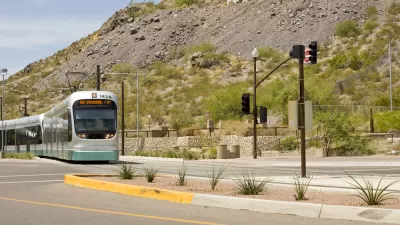The Obama administration has been touting its dedication of $48.1 billion in stimulus money to roads and transit projects. But it's all going towards new projects, not day-to-day operational needs.
This piece from The Nation looks at transit agencies that are struggling to make ends meet or even cutting services despite the new funding.
"[T]hose funds are dedicated almost exclusively for new investments instead of supplementing existing operating funds. Alas, even while states and cities are laying train tracks and buying new buses, they are being forced to cut bus routes and raise subway fares. Mass transit lines are being eliminated and fares raised in cities across the country. And cost-cutting measures mean that transit employees are being laid off from Anchorage, Alaska, to Miami, Florida. Laying off workers from good civil service jobs, and making traveling more expensive and difficult, could hinder the Obama administration's efforts to stimulate the economy."
FULL STORY: A Seat on the Bus?

Manufactured Crisis: Losing the Nation’s Largest Source of Unsubsidized Affordable Housing
Manufactured housing communities have long been an affordable housing option for millions of people living in the U.S., but that affordability is disappearing rapidly. How did we get here?

Americans May Be Stuck — But Why?
Americans are moving a lot less than they once did, and that is a problem. While Yoni Applebaum, in his highly-publicized article Stuck, gets the reasons badly wrong, it's still important to ask: why are we moving so much less than before?

Research Shows More Roads = More Driving
A national study shows, once again, that increasing road supply induces additional vehicle travel, particularly over the long run.

Judge Halts Enforcement of Anti-Homeless Laws in Grants Pass
The Oregon city will be barred from enforcing two ordinances that prosecute unhoused residents until it increases capacity and accessibility at designated camping sites.

Advancing Sustainability in Los Angeles County Schools
The Los Angeles County Office of Education’s Green Schools Symposium brings together educators, students, and experts to advance sustainability in schools through innovative design, climate resilience strategies, and collaborative learning.

Using Old Oil and Gas Wells for Green Energy Storage
Penn State researchers have found that repurposing abandoned oil and gas wells for geothermal-assisted compressed-air energy storage can boost efficiency, reduce environmental risks, and support clean energy and job transitions.
Urban Design for Planners 1: Software Tools
This six-course series explores essential urban design concepts using open source software and equips planners with the tools they need to participate fully in the urban design process.
Planning for Universal Design
Learn the tools for implementing Universal Design in planning regulations.
City of Moreno Valley
Institute for Housing and Urban Development Studies (IHS)
City of Grandview
Harvard GSD Executive Education
NYU Wagner Graduate School of Public Service
City of Cambridge, Maryland
Newport County Development Council: Connect Greater Newport



























